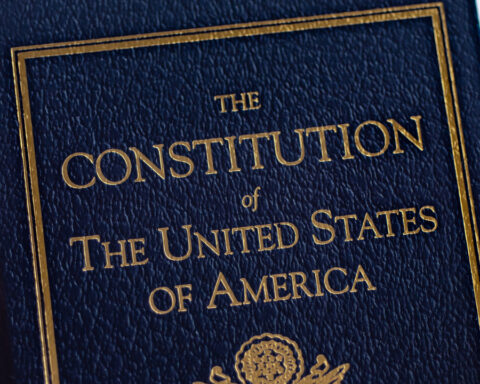In the past month, this column has twice addressed the unbridled propensity of federal intelligence agencies to spy on Americans without search warrants as required by the Fourth Amendment to the U.S. Constitution.
These agencies believe that the Fourth Amendment — which protects the individual right to privacy — only regulates law enforcement and does not apply to domestic spying.
There is no basis in the constitutional text, history or judicial interpretations for such a limiting and toothless view of this constitutional guarantee. The courts have held that the Fourth Amendment restrains government. Period. Last week, Congress got burned when the CIA released a heavily redacted summary of its current spying in the United States.
Here is the backstory.
When the CIA was created in 1947, members of Congress who feared the establishment here of the type of domestic surveillance apparatus that the Allies had just defeated in Germany insisted that the new CIA have no role in American law enforcement and no legal ability to spy within the U.S. The legislation creating the CIA contains those limitations.
Nevertheless, we know from statements of former governors of several states that CIA agents claim to be physically present in all 50 statehouses in the United States.
The agents who have infiltrated state governments didn’t arrive until after Dec. 4, 1981. That’s the date that President Ronald Reagan signed Executive Order 12333, which purports to give the CIA authority to spy in America — supposedly looking for narcotics from foreign countries — and keep from law enforcement whatever it finds.
Stated differently, while Reagan purported to authorize the CIA to defy the limitations imposed upon it by the Constitution and by federal law, he insisted on a “wall” of separation between domestic spying and law enforcement.
So, if the CIA using unconstitutional spying discovered that a janitor in the Russian Embassy in Washington was really a KGB colonel who abused his wife in their suburban Maryland home, under E.O. 12333, it could continue to spy upon him in defiance of the Fourth Amendment and the CIA charter, but it could not reveal to Maryland prosecutors — who can only use evidence lawfully obtained — any evidence of his domestic violence.
All this changed 20 years later when President George W. Bush demolished Reagan’s “wall” between law enforcement and domestic spying and directed the CIA and other domestic spying agencies to share the fruits of their spying with the FBI.
Thus, thanks to Reagan and Bush authorizing it, and their successors looking the other way, CIA agents have been engaging in fishing expeditions on a grand scale inside the U.S. for the past 20 years. Congress knows about this because all intelligence agencies are required by statute to report the extent of their spying secretly to the House and Senate Intelligence Committees.
This, of course, does not absolve the CIA of its presidentially authorized computer hacking crimes; rather, it gives Congress a false sense of security that it has a handle on what’s going on.
What’s going on is not CIA lawyers appearing before judges asking for surveillance warrants based upon probable cause of crime, as the Constitution requires. What’s going on is CIA agents going to Big Tech and paying for access to communications used by ordinary Americans.
Some Big Tech firms told the CIA to take a hike. Others took the CIA’s cash and opened the spigots of their fiber optic data to the voracious federal appetite.
If the CIA went to a judge and demonstrated probable cause of crime — for example, that a janitor in the Russian Embassy was passing defense secrets to Moscow — surely the judge would have signed a surveillance warrant. But to the CIA, following the Constitution is too limiting.
Thus, by acquiring bulk data — fiber optic data on hundreds of millions of Americans acquired without search warrants — the CIA could avoid the time and trouble of demonstrating probable cause to a judge. But that time and trouble were intentionally required by the authors of the Fourth Amendment so as to keep the government off our backs.
Not to be outdone by its principal rival, the FBI soon began doing the same thing — gathering bulk data without search warrants.
When Congress learned of this, it enacted legislation that banned the warrantless acquisition of bulk data. Apparently, Congress is naive enough to believe that the CIA, the FBI and the National Security Agency, their cousin with 60,000 domestic spies, actually comply with federal law.
Last week, that naivete was manifested front and center when the CIA sent a letter to the Senate Intelligence Committee documenting the extent of its domestic acquisition of bulk data on Americans.
Two senators who should have known better claimed they were “shocked” at what they read. They read an admission of continued CIA warrantless bulk acquisition of personal data on unsuspecting and unsuspected Americans, and they saw large portions of the letter redacted so that the senators do not know the nature of the data received.
So, notwithstanding the persistent efforts of members of Congress from both parties to limit and in some cases to prohibit the warrantless acquisition of bulk data by the CIA from Americans, the practice continues, the CIA defends it and presidents look the other way.
In 1947, Congress created a monster which today is so big and so powerful and so indifferent to the Constitution and the federal laws its agents have sworn to uphold that it can boast about its lawlessness, have no fear of defying Congress and always escape the consequences of all this largely unscathed.
I suspect the CIA and its cousins get away with this because they spy on Congress and possess damning personal data on members who regularly vote to increase their secret budgets. When will we have a government whose officials are courageous enough to uphold the Constitution?
Photo by gorodenkoff.
Judge Andrew P. Napolitano is the youngest life-tenured Superior Court judge in the history of the State of New Jersey. Now, Napolitano works as Fox News’ Senior Judicial Analyst, Judge Napolitano broadcasts nationwide on the Fox News Channel and the Fox Business Network, and lectures nationally on the U.S. Constitution, the rule of law, civil liberties in wartime, and human freedom. He also writes a week column, nationally syndicated by Creators.








